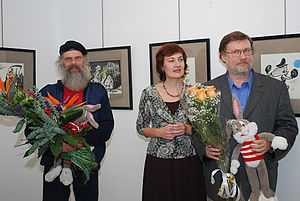Daryl Cagle
| Daryl Cagle | |
|---|---|
 Daryl Cagle is the cartoonist for NBCNews.com | |
| Born | 21 June 1956 |
| Area(s) | Cartoonist, blogger, satirist |
Notable works |
NBCNews.com The Muppets |
|
Official website | |
Daryl Cagle (born 1956) is an American editorial cartoonist, the publisher of Cagle.com and owner of Cagle Cartoons, Inc., a newspaper syndicate.
Cagle worked with The Muppets from 1979 through 1993. He drew a daily editorial cartoon panel titled, "TRUE!" for Tribune Media Services in 1995 and went on to draw local editorial cartoons for Hawaii's Midweek newspaper. He moved to drawing daily cartoons for Gannett's Honolulu Advertiser newspaper, he became the cartoonist for Slate.com in 2000; in 2005 Cagle moved from Slate.com to become the cartoonist for msnbc.com.
Cagle is an occasional syndicated columnist and speaker; he is a past president of the National Cartoonists Society and the National Cartoonists Society Foundation.[citation needed]
Cagle publishes iPhone, Android and iPad apps, including one with cartoons about Tiger Woods which made news when it was rejected by Apple Inc., because of Apple's policy of not allowing apps that ridicule public figures.[1]
In 2001, Cagle started Cagle Cartoons, Inc, a political cartoon and column syndicate which distributes the work of newspaper editorial cartoonists and columnists from around the world to approximately 850 subscribing newspapers. Cagle Cartoons is a "package service" where subscribing publications receive all of the content and can reprint whatever they choose.[citation needed]
Controversy
Mexican Flag Cartoon

In September 2010, Cagle's cartoon showing the eagle in the Mexican flag dead in a pool of blood drew criticism after running on the front pages of many Mexican newspapers. The cartoon depicts the green, white, and red Mexican flag with a bullet-riddled eagle sprawled in the center of the emblem. Mexico's coat of arms includes the eagle perched on a prickly pear cactus, devouring a snake.[2][3]
Many outraged Mexican readers pointed out that it is against the law in Mexico to alter the image of the flag – a law that didn’t deter Mexican newspapers from printing the cartoon. Ricardo Alday, a spokesman for the Mexican Embassy in Washington, said that "as any democratic society, Mexico respects and defends freedom of speech and freedom of expression, in any way it's manifested. Regarding the case of Mr. Cagle's cartoon, we differ on the use he makes of the Mexican flag and the message it conveys."
"It is the role of editorial cartoonists to criticize governments and nations, and to use the symbols of nations in our cartoons," Cagle wrote in response to the outrage. "Cartoonists all around the world use flags in their cartoons and no country can opt out of criticism because they view their own flag as "sacred". This attitude outrages my Mexican critics, especially since it comes from an ugly, foreign, American cartoonist."[4]
Trips Abroad

Russia
In December 2010, Cagle visited Vladivostok on behalf of the U.S. State Department where he participated in a joint exhibition with Russian political cartoonist John Kudryavtsev. Kudryavtsev drew harsh cartoons reflecting the American-Russian relations during the Cold War of the 1980s, and said during the exhibition's reception, "I hope the Pentagon has forgiven me." [5]
Colombia
In February 2010, Cagle traveled to Colombia on behalf of the U.S. State Department to attend an editorial cartoonists conference in Bogota as the conference's only American cartoonist.[6] Cartoonists enjoy freedom of the press, and according to Cagle "their lack of respect for their president speaks well of healthy press freedoms in Colombia." Many of the Colombian cartoonists have eccentric one-word pen names such as Mico (monkey), ChÃ-colo (corn-on-the-cob), Matador (killer) and Bacteria.
Algeria
In October 2009, Cagle was invited to Algiers to take part in the city's second annual comics festival. According to Cagle, Algerians like a strange mix of Arabic manga and euro-styled storytelling comics, and political cartoonist there struggle under pressure from the government. At the time, Algerian cartoonist Ali Dilem, who now lives outside of the country, faced 25 lawsuits from government officials he has insulted in his cartoons, and the threat of civil suits keeps some cartoonists from criticizing the government.[7]
China
In June 2008, Cagle traveled to China where he spoke to college audiences about American political cartoons. "Chinese cartoonists almost never draw their leaders, and my Bush-bashing cartoons seemed very foreign to Chinese audiences," Cagle wrote, adding that the audiences he came across seemed genuinely concerned for his safety due to his cartoons about top American politicians, like George W. Bush.[8]
References
- ↑ "You Can Ridicule Obama but Don't Bash Tiger Woods in Apple's iPhone and iPad universe.". NJ.com.
- ↑ "Get real, Mexico, it's just a cartoon.". CNN.
- ↑ "Mexican Flag Cartoon and Angry Readers.". Los Angeles Daily News.
- ↑ "My Mexican Flag Cartoon and Angry Readers". Cagle Cartoons.
- ↑ "Reflections of Life: Cartoons for Adults…". U.S. Consulate Vladivostok.
- ↑ "Editorial Cartooning in Colombia". Cagle.com.
- ↑ "My Cartoonist Week In Algiers". Cagle.com.
- ↑ ""Not So Funny In China"". CagleCartoons.com.